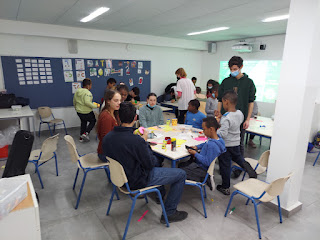Here is an article on our music project at Elifelet, published by Mako, the Israeli television network.
https://www.mako.co.il/home-family-kids/Article-26ecc0828545381027.htm
Here is a translation of the article:
Betto lives in a room with one bed and two brothers. The first three years of her life were spent in a a crib in a “children’s warehouse,” the only method of child care available to refugee parents in south Tel Aviv: no other children to play with, no one to talk with her, no one to hug her. Betto’s mother works from 8 in the morning to 9 at night. Now in third grade, Betto can barely read, has difficulties with math, and often bursts out in tears for no reason.
But twice a week, for a single hour, Betto’s eyes glow and her smile lights up her face. Twice a week she goes with four classmates to her violin lesson, and is swept up in the magic of music. She barely speaks, but the music – the music is her language.
In Elifelet, an NGO serving the children of refugees, we believe in the power of music to change lives. Elifelet runs after-school programs for hundreds of statusless children. “Statusless” – a strange word, certainly a word foreign to any western country, don’t you think? But there you have it – these children, the children of refugees who fled for their lives from oppression, torture, and genocide, and who sought asylum in Israel, do not exist in the eyes of the Israeli government. They have no identity number, no state health care, no national insurance, no social services. These are children who were born in Israel, whose language is Hebrew, whose holidays are the Israeli national holidays. These are children who are, in every respect, Israeli. In every respect, except one: they aren’t.
Into this vacuum steps Elifelet. We go into the children’s warehouses, and transform them into child care centers that are humane and loving. In our after-school programs, our children receive the support and care that the Israeli government refuses them: remedial teaching, hot meals, therapy, and activity programs. We look at the child as a whole with his or her environment: we support the families, provide furniture and equipment, and financial support where necessary. We create an environment where the children can grow and overcome their disadvantages to become healthy and happy.
The music program in the after-school programs has been running for three years. We started with a donation of six violins from Ginzburg, a Tel Aviv instrument store. By the end of the second year, we had enrolled six children in the municipal music school. This year we are starting off with 15 second-year children in the music school, 35 beginning fiddlers, and lessons in piano, guitar, ukulele, and choir. This year our music will reach 80 children.
But the numbers don’t tell the real story. Because the real story is the story of Betto, and Arsema, and Yefet and dozens of other children, whose lives have been lit by music. And it is not only the children; The parents, too, are touched by this project. In accordance with our philosophy of treating the whole child, we have met the parents, and visited many of them in their homes. And we have found that the parents are more ambitious for their children than the typical “Yiddishe Mamma” – they make sure their children practice every day, and keep apace with their progress. “My son will keep it up – the violin is more important than anything else,” one mother told me. “If he doesn’t practice, I will cancel his football.” Well, you don’t have to go overboard, I told her; he can play the violin and play soccer too.
Until this year, our music program relied entirely on volunteers. We recruited volunteers from Rimon, the leading school in Israel for jazz and popular music, who taught piano and guitar; we brought in high school students from Talma Yellin, the prestigious music and arts school, to give workshops. And we enlisted amateur violinists from the world of high tech, medicine, and more.
But this year, we have grown so much that we have had to hire a professional teacher. In addition, we subsidize the tuition of our children in the municipal music school, and will have to pay for busses to take the kids to orchestra practice, as well as other expenses. In short, what used to be a program that cost nothing, we are now running up expenses.
For the next two weeks we are running a campaign to raise the additional funds we need to continue to grow our project, and all the work of Elifelet. The city government of Tel Aviv recognizes the critical importance of our work, and provides the basis of our budget. But it is not enough; beyond the basic services that the city pays for, all the other activities, the therapists, the sports, and, of course, the music, are paid for from private donations. So please, don’t let the music die.


.jpeg)

















